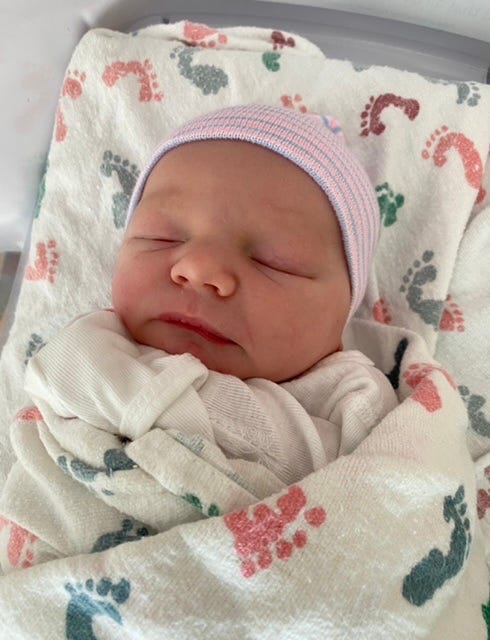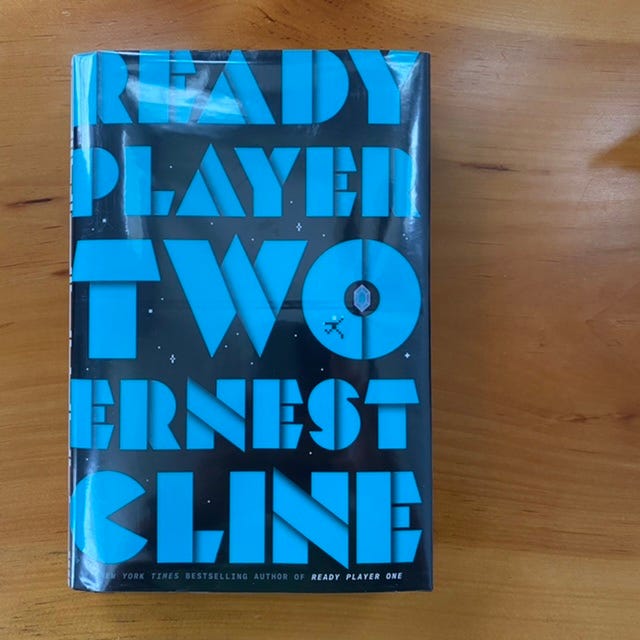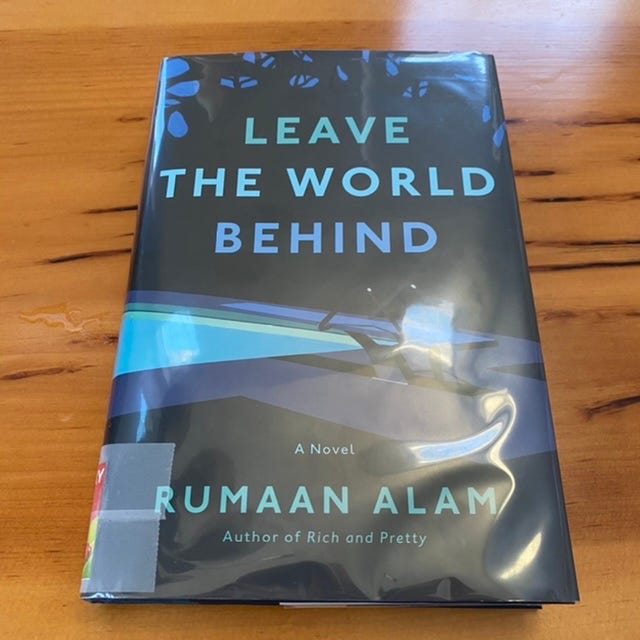What to Read Next (No. 159): fiction that leaves the world behind
This edition of the newsletter has been written for a few weeks, and you’re now getting it in your inbox because my wife and I welcomed our third baby to the world this week! Bowen John Anderberg is healthy, my amazing parter in crime is recovering well, and though we’re of course tired, we’re beyond delighted with this new little creature in our lives.
Both of the books featured today were highly anticipated going into 2020. One lived up to the hype (and then some) and ended up as one of my favorite reads of the year. The other was a let down, but still entertaining enough.
Though these books do take place on Earth, both leave our world behind in important ways.
I also have a fun interview with a historian/podcaster to share with you.
Let’s get right to it.
A Few Links
Check out my latest bookish Art of Manliness article: Embrace Reading for the Sake of Reading. (If you found this newsletter through that piece, thanks for coming aboard!)
I made an appearance on Colorado Public Radio last week on Inauguration Day. Ryan Warner and I chatted about inaugurations, crises, and a surprising favorite president (though, to be clear, he’s not my absolute favorite, just a really likable and under-appreciated guy).
My favorite POTUS bios from my years-long reading project. I finished up the presidents and you’ll be seeing a long Art of Manliness article featuring all those books on President’s Day.
Ready Player Two by Ernest Cline
Published: 2020 | Pages: 370
“The simulation had now become indistinguishable from real life.”
By the time The Office got to seasons 8 and 9, we all knew it was a show in decline and well past its creative peak. But, we watched anyway because The Office universe was so magical. There was a sense of it not wanting to end and needing to soak up every minute with Jim, Pam, Dwight, Michael, and the others. And, we still got some great moments in those final seasons!
That’s exactly how I felt about Ernest Cline’s sequel to the wild, epically original ride of Ready Player One.
In the first novel, teen protagonists Wade, Aech, and Art3mis embark on a quest to inherit the virtual world of OASIS after the death of the legendary James Halliday.
The sequel opens up nearly right after they win the prize, and new CEO Wade Watts discovers something that Halliday left behind: a neural headset that allows the user to access OASIS and feel, taste, and utterly inhabit this virtual world.
You don’t need to know a ton about the plot. It’s basically a revamp of the first book, with our fearless crew on another pop culture-laden, nostalgic video game quest against the forces of evil.
The strength of Ready Player One was its creative originality and teen rom-com energy. The sequel doesn’t give the reader that same excited feeling—doesn’t really approach it, even—because it so relies on the same things that made RP1 so powerful. It doesn’t feel fresh anymore.
But, as I said above, Cline’s world is so compelling that it’s worth taking the time for, even if it’s just “cotton candy” reading (as my friend Kyle put it). There’s not much lasting merit here, but it’s plenty entertaining in the moment.
On Wednesday, subscribers got a look at 10 books I read 10 years ago that have stuck with me. It’s truly the ultimate recommendation to have read something a decade ago and still wholeheartedly endorse it. Get access to that list—as well as all the subscriber-only archives—by becoming a paid member. Get more details here or subscribe below:
Leave the World Behind by Rumaan Alam
Published: 2020 | Pages: 241
“However unlucky they were, they were also lucky.”
The more I think about Alam’s haunting, affecting novel, the more I love not only the story, but the individual sentences he’s crafted for us. I’ll say it from the start: I loved this book, and it seemed like the perfect companion reading for a pandemic.
It starts with a very normal white family—Dad, Mom, two adolescent kids—arriving to a vacation rental on Long Island. There are some minor family tensions, but it’s more teen angst and spouses sneaking cigarettes than anything truly serious.
But then there’s a knock on the door, and they’re interrupted by the older black couple who own the home. There’s been a major blackout in the city and they’ll all need to share the home for a bit. With no internet, no TV, no cell service, it’s nearly impossible to get any information. They aren’t in any serious danger and the two sets of strangers (plus kids) are forced to weather the crisis together.
It feels like a set up for a novel that meditates heavily on race, but that wasn’t the path it took. In the absence of a quickly-paced plot, Alam focuses more on the power of relationships and what it’s like to be in the midst of an unknowable disaster, simultaneously living with people you love more than anything and with people you don’t know one bit about:
“You demanded answers, but the universe refused. Comfort and safety were just an illusion. Money meant nothing. All that meant anything was this—people, in the same place, together.”
In the midst of this pandemic, we’ve been in the same sort of unknowable disaster. There’s plenty of fear and grief to go around, but we have to keep living, and the meaning and value of our relationships was quickly clarified.
The way Alam captured the inner psychology of these various characters was masterful, memorable, and even quite moving at times. There’s fear, there’s disbelief, there’s overconfidence, there’s playacting at confidence. Everything you’ve felt in the last year is present in Leave the World Behind.
There was even, at times, happiness to be found:
“The world was over, so why not dance? The morning would come, so why not sleep? An end was inevitable, so why not drink, eat, enjoy the moment, whatever it contained?”
When a writer can accurately capture your feelings—what the core of your being is thinking and experiencing—it’s incredibly affirming; you feel validated and seen and instinctively say, “Yes, that’s it!” Alam does that in spades in this book.
Though I don’t think this is a novel that everyone will enjoy, I do think that if you like this one, you’ll really like it. I sure did.
A Few Bookish Questions With The History Book Podcast
Jacob Thomas hosts an up-and-coming podcast called The History Book. It’s a wide-ranging show that’s always interesting. Check out the podcast and find him on Twitter too.
1. Are there any books that first got you interested in history?
Growing up I always really loved the Magic Tree House books. The older I got, the more my parents, and especially my dad, encouraged me to love history. To just tell a short little story, when I was in high school the city library knew me by name, because every day when I walked home, I stopped in to ask if they had new Abraham Lincoln books. I remember checking out and then re-checking out various Lincoln books, until one of the librarians had to stop me, because someone else needed the book.
2. Your podcast covers a wide array of subjects and eras. Do you have a period or topic of history you’re particularly interested in (and books about it)?
I consider myself a wide-reaching historian, so I try to not only expand everyone else’s knowledge, but mine as well. That’s why I end up doing episodes on stuff like the wreck of the Edmund Fitzgerald. I have an interest in the American Civil War and Reconstruction, as well as anything related to North Carolina history. To be a bit more detailed, my thesis (and really my favorite topic) was on the Wilmington Race Riot of 1898 and how it has been memorialized, especially by the state of North Carolina. In terms of books, the best book in my opinion on the Civil War and North Carolina history are Confederate Goliath by Rod Gragg and Blood Done Sign My Name by Timothy B. Tyson. Both of those books are excellent.
3. As a historian, you know that while the last year has certainly been a wild ride, it’s not entirely without precedent. Are there books that have helped you make sense of 2020 and now 2021?
I’m not sure there are any books that can do 2020 and now 2021 the justice it truly deserves. I think we can certainly say there are precedents for 2020, particularly when comparing the COVID-19 crisis to the Spanish Flu Epidemic in 1918. In just the last four years, the political climate has also become something our generation hasn’t seen before, yet still has some similarities. Now as far as books go, I finished reading Madness Rules the Hour by Paul Starobin, which speaks on the secession crisis in Charleston, SC in 1860 and how the media impacted it.
4. What do you read for fun?
I read a lot of historical non-fiction. However, I enjoy reading about sports and would love to do more episodes for The History Book podcast that are sports related. I also love movies, specifically Star Wars and any Marvel movies.
5. What are you reading and enjoying right now? What’s next?
Right now I am working through This Republic of Suffering by Drew Gilpin Faust. I believe that Appomattox: Victory, Defeat, and Freedom at the End of the Civil War by Elizabeth R. Varon will be next. There’s always another book to read!
Thanks so much for the time and inbox space. If you enjoy the newsletter, consider subscribing not only to get more content, but also simply to support the work I’m doing.
As always, let me know what you’re reading. I love hearing!
-Jeremy




Congratulations on the new addition in your family!
Congrats on the healthy baby and the exquisite name choice. I foresee a future where Archer and Bowen become some sort of dynamic duo :D
And thanks for the shoutout! You didn't have to do that, friend, but it made my day.